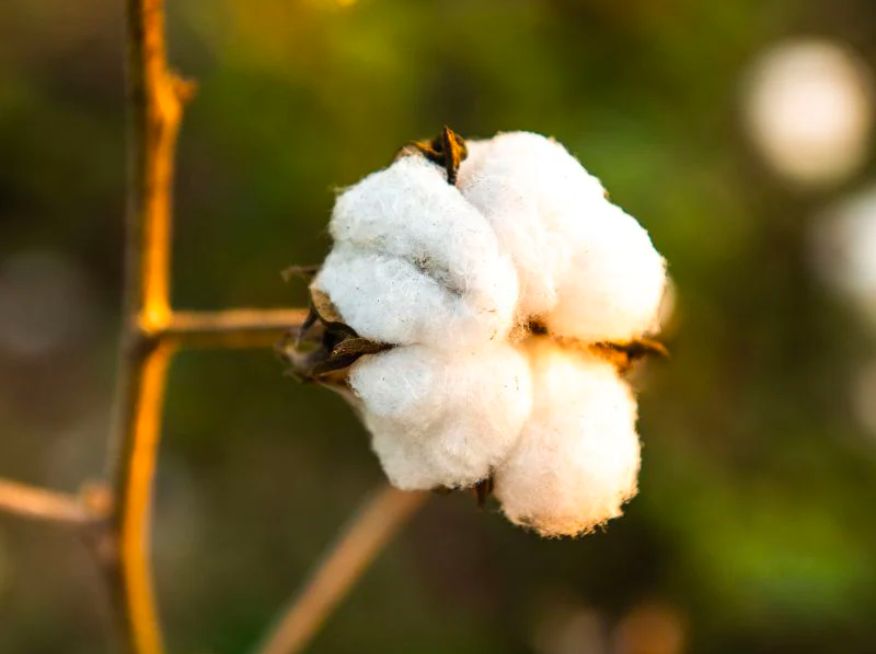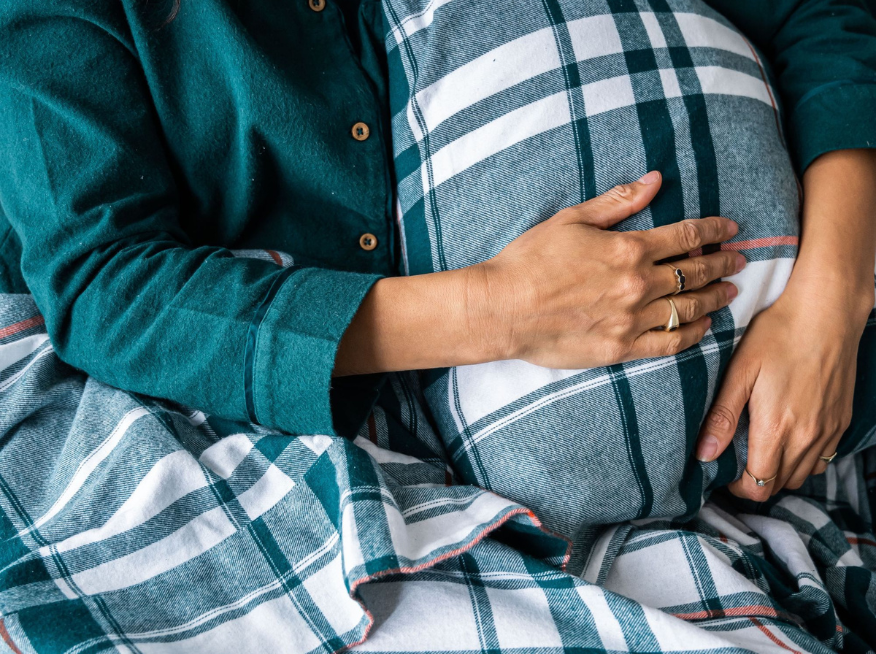


By Vinita Baravkar

There’s no denying that sleep is important. Yet many people today are finding good quality sleep harder to come by and experience chronic sleep problems.
The cause? Anything from eating and drinking late, to stress, and failing to relax before bed.
And whilst we could all do with eliminating distractions such as light and technology, sometimes it helps to know what kind of sleeper you are. Knowing your sleeping style means we can take a few steps back and tackle the issue with a much simpler solution: our bed sheets.
Bed sheets are an often overlooked impact factor when it comes to improving sleep quality. Sleep expert Jeff Kahn shares that “the material can impact thermal regulation, which is important for maintaining a comfortable body temperature during sleep.” Chief medical advisor at Sleepline, Danielle Kelvas agrees. “Some materials have unique properties that can affect your sleep experience. For example, synthetics have a tendency to trap heat, making for a more uncomfortable sleep experience.”
The texture of the material you choose can also have an impact, says Jeff, with some individuals finding softer fabrics to reduce irritation, increasing comfort. The material can also have an impact on moisture wicking which “is important for managing sweat and preventing discomfort and irritation during sleep.”
So what is the best material for bed sheets?
According to Jill Zwarensteyn, a certified sleep science coach at Sleep Advisor, “different bed sheet materials are better for different types of sleepers.” Whether you’re a hot sleeper in need of some cooling sheets, sheets suited to your skin sensitivities or to keep you warm in the cold winter months, will all affect which material is determined to be a right fit.
By the end of this guide you’ll have your hands on five different types of sheets that’ll help bring relaxation back into the bedroom so you can harness more energy to spend quality time with family and doing the things you love.
The best part?
All sheets mentioned below are certified organic at Bhumi. That means a guaranteed no toxins, pesticides, or unfair labour, all without comprising the quality to help you sleep soundly and sustainably.
Read on to find out which of the five are the fit for you.
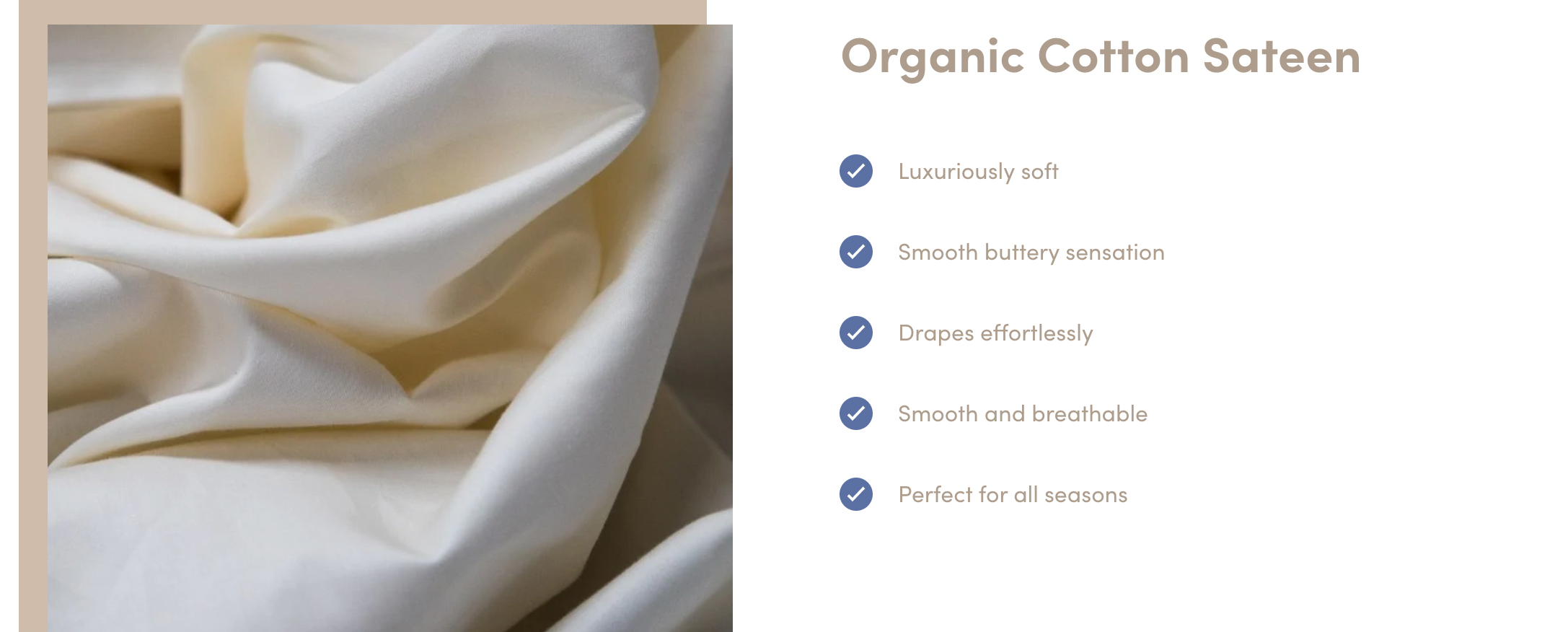
“Such high quality sheets that feel great and not easily creased. Luxury feel that provides a great nights sleep” - Florence
Rather than being a specific material, sateen refers to the way a fabric is woven. In particular, sateen is a type of weave where threads are woven tightly together vertically in a one yarn under, four yarns over pattern, creating a smooth, soft texture.
Described by many as “buttery soft”, sateen sheets have wrinkle-resisting qualities making them easy to care for and maintain your temperature in any season.
In Jeff’s opinion, “cotton is a popular choice for bed sheets due to its breathability, softness, and durability. It can also be hypoallergenic, making it a good choice for people with allergies or sensitive skin.”
Sateen sheets are best suited for you if you’re looking for a set of sheets that can be used for all seasons. And if you’re someone who loves sheets with a luxurious buttery soft feeling, and prefers a fabric that’s wrinkle-resistant and easy to care for, then sateen sheets are a great option for you.
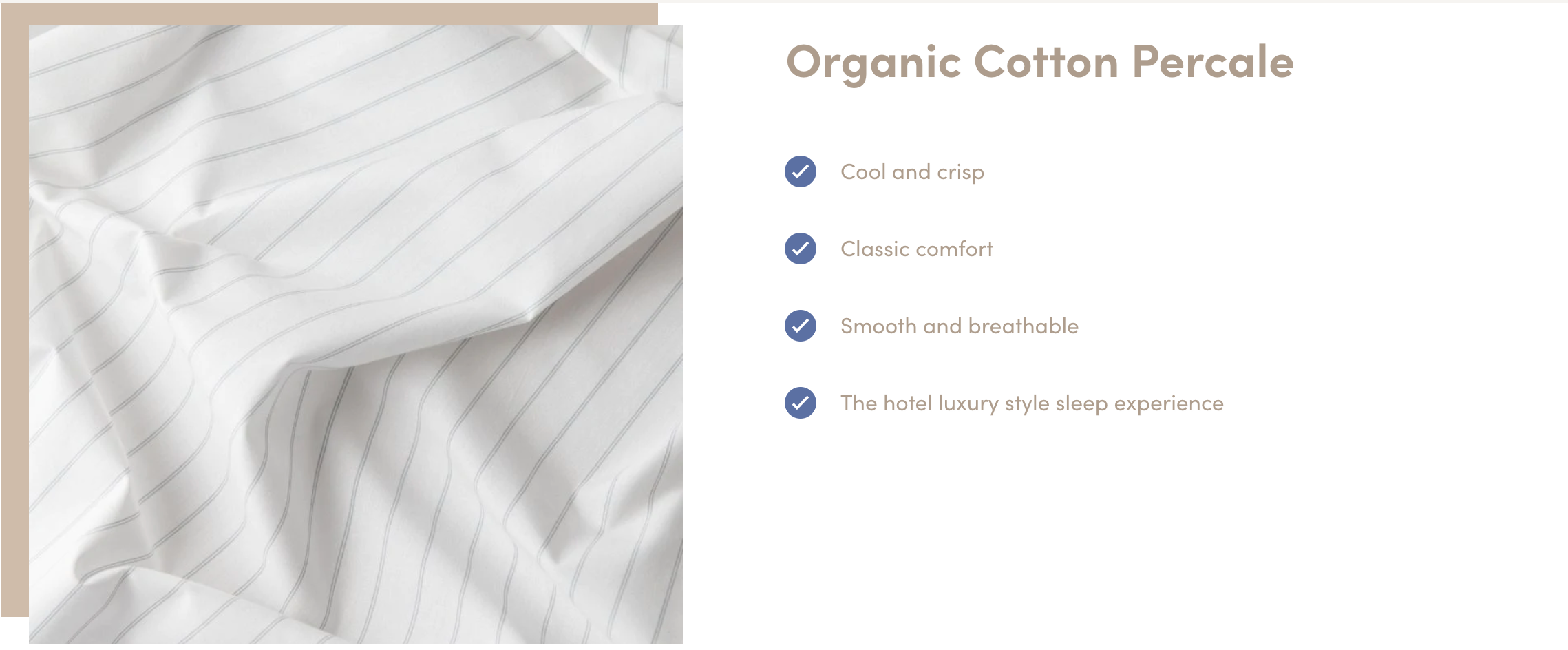
“By far my most favourite linen purchase ever! I love the crispness of the percale, yet it remains luxuriously soft and such a pleasure to sleep on/under. Such peace of mind also, knowing it is organic.” - Jacqueline
Similar to sateen, percale refers to a type of weave. Unlike sateen, percale is known as a ‘plain weave’ which essentially consists of a ‘one thread over, one thread under’ approach, resulting in firm bed sheets with no sheen or gloss but a cool and crisp feel instead.
Read more: The 5 Most Sustainable Fabrics You Need To Know About
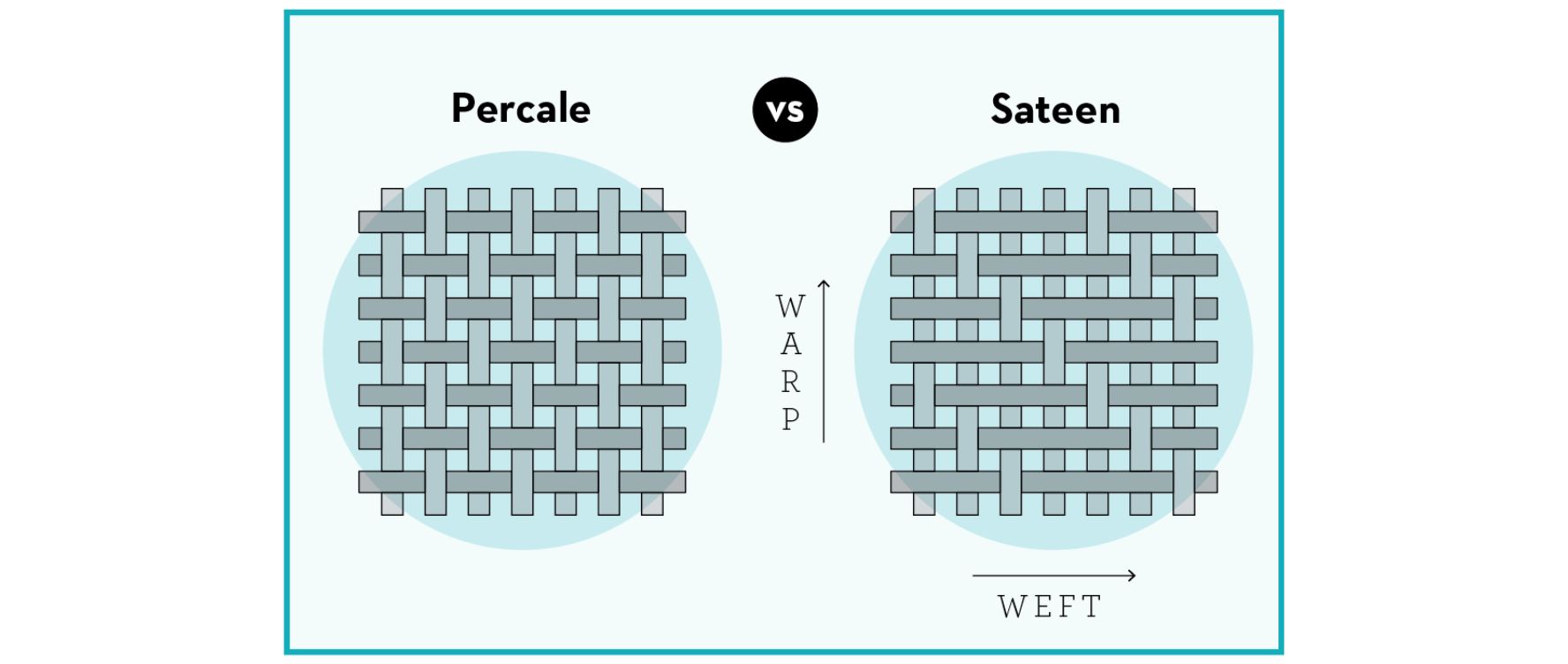
[Caption: percale vs. sateen weave - source]
The plain weave is what gives percale sheets their high strength and durability. Though they’re known to wrinkle a little bit, the issue can be easily fixed with a very light spray of water and hand combing.
Percale sheets are best suited for you if you feel hot or sweat at night, struggling to sleep on warmer, balmy summer nights, and love the feel of fresh, crunchy, cool and crisp sheets.
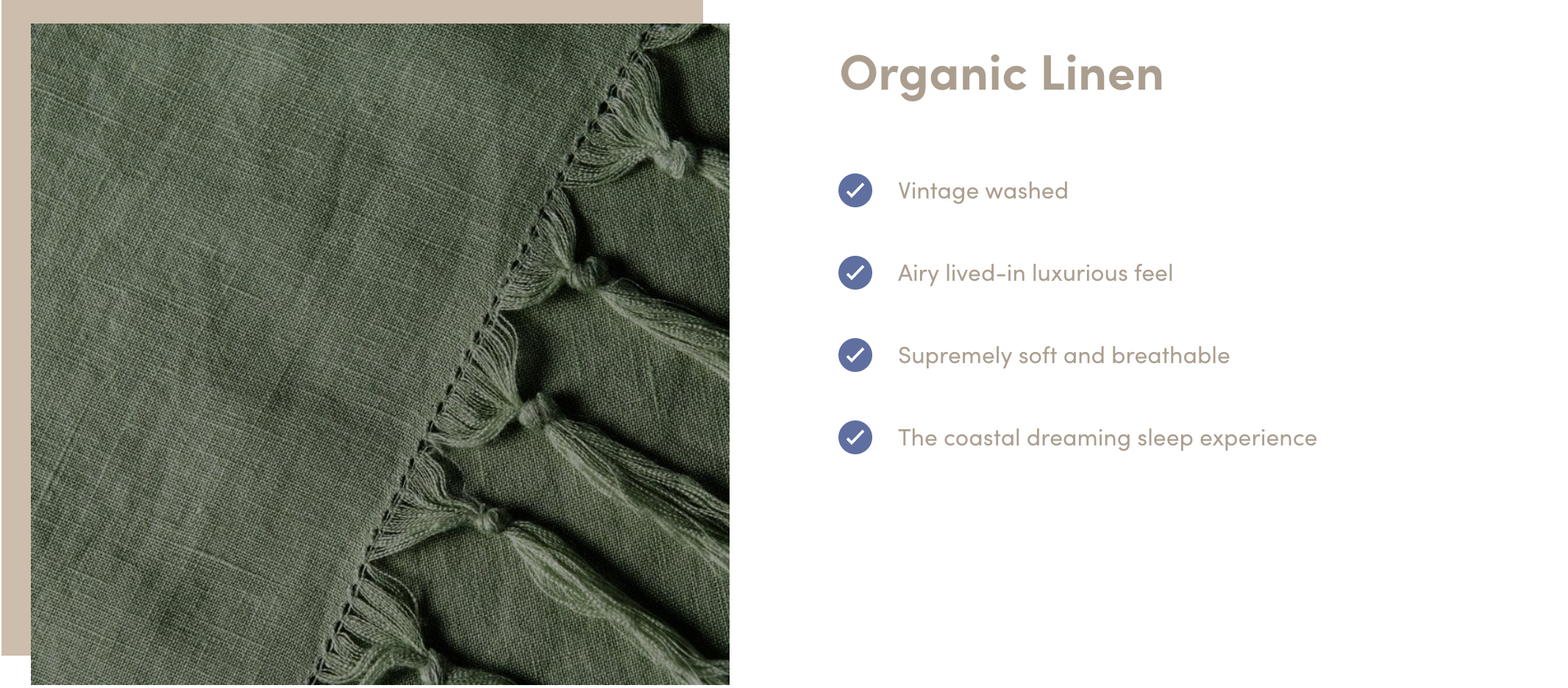
Linen is a lightweight fabric made from flax plant fibres. One of the oldest fibres known to humans, the airy, lived-in feel of linen makes for a wonderful night’s sleep, whilst the classic earth tones help bring a touch of nature to your bedroom. “It is also durable and can become softer with each wash”, adds Jeff.
Though brands like Bhumi use organic linen, ethically derived from pure Belgian flax, organic linen is only a small part of the global linen supply chain and is very different to traditional linen which relies heavily on pesticides.
The airy lived-in feel of linen makes it a fabric perfect for you if you like to regulate your body temperature perfectly. Linen is also a great fabric for you if you have skin disorders or sensitivities as it’s a hypoallergenic material, meaning it doesn’t contain common skin irritants or allergens.
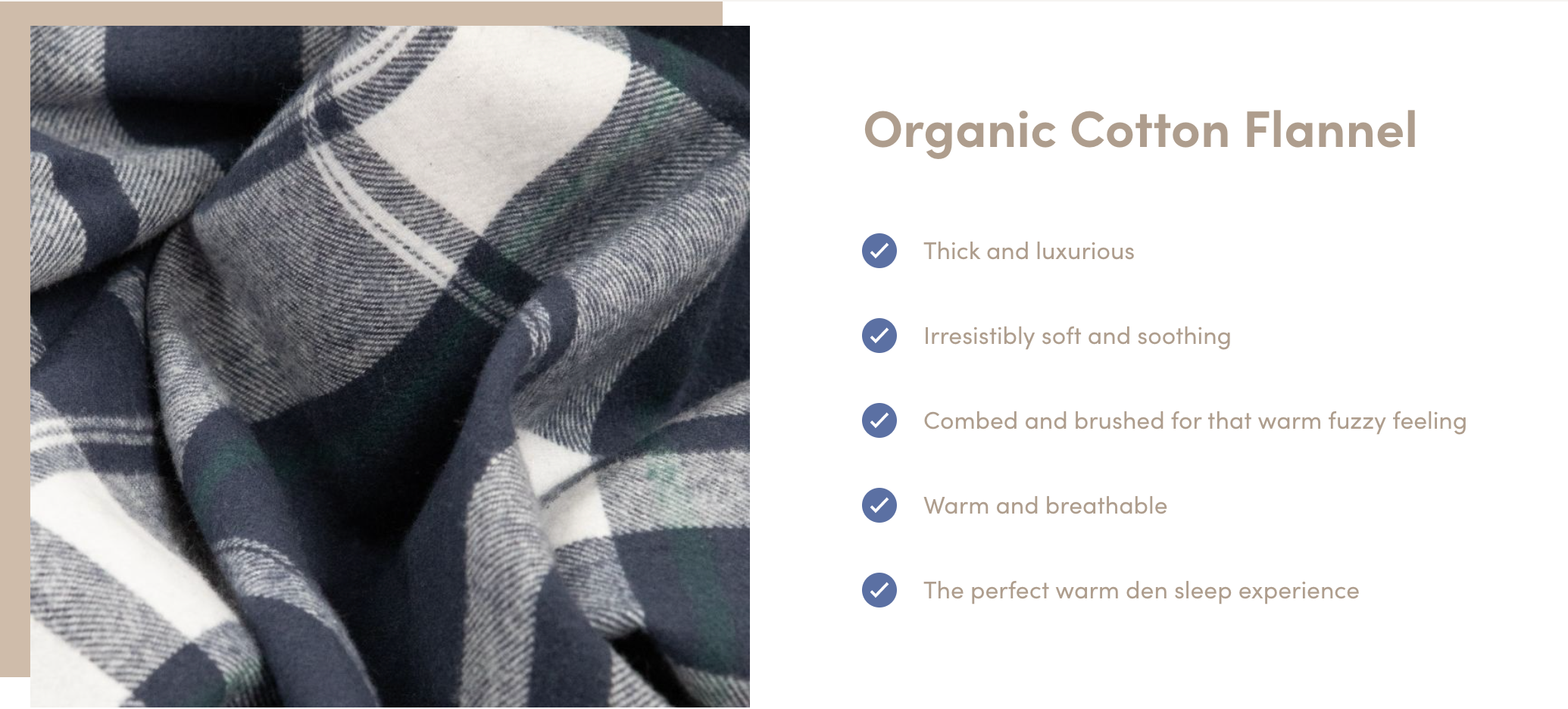
Confused for its own stand-alone material, flannelette is actually a plain-weave fabric made from cotton. It’s medium-weight and brushed on both sides to raise the fibres, giving it that characteristic warm and fuzzy feeling. This texture is what makes it a soft and cosy fabric to sleep in, a perfect companion for cold nights when you need to maintain that warm body temperature.
Read more: What is Flannelette? (Hint: It's Not Exactly Flannel)
If you’re someone who constantly feels like you’re about to freeze at night and love that warm and fuzzy feeling, then flannelette might just be the fabric you’re looking for. Flannelette is also a perfect choice if you’re choosing to buy sheets seasonally and are looking for a material to see you through the cold winter nights.
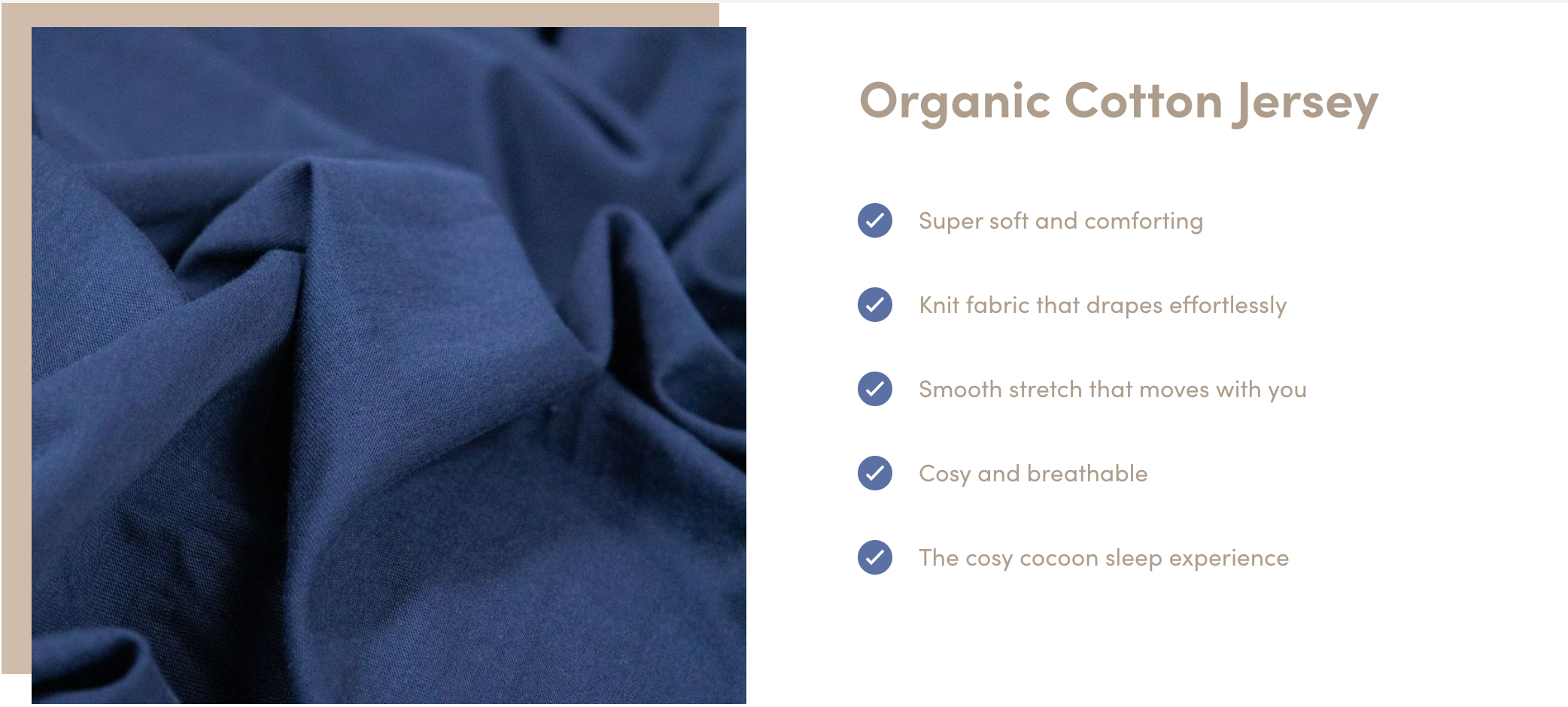
Similar to flannel, jersey is a knitted cotton fabric. Historically made from animal products like wool, brands like Bhumi only use organic cotton. Jersey is stretchy, lightweight, highly absorbent and breathable, making it a great choice for comfort.
Jersey is the perfect choice if you need a slightly warmer temperature to sleep, and are looking for a soft, comforting cocoon to sleep in. If you’re shopping for seasonal sheets, jersey is a great choice for the cooler autumn and winter evenings.
To help simplify your decision-making process, the table below compares the pros and cons of five popular bedding fabrics: sateen, percale, linen, flannel, and jersey. This table also includes information on the sleep types each material suits best.
It’s important to remember, that regardless of the material you choose, bed sheets should be washed on a regular basis. “Pillowcases can absorb oil and dirt and transfer this to your skin, causing acne. And dust mites thrive in warm environments like bedding and can trigger nighttime allergies that disrupt your sleep”, Jeff explains.
| Material | Pros | Cons | Sleep Type |
|---|---|---|---|
| Sateen weave | Super soft fabric, wrinkle-resistant and maintains your temperature in any season. | May not be warm enough on super cold nights | Looking for bed sheets suitable for all seasons. |
| Percale weave | High strength and durability, cool and crisp | Known to wrinkle a little | Feel hot or sweat at night |
| Linen | Airy, lived-in feel, resistant to stains and hypoallergenic. | If not bought organic, then is grown and processed using harsh chemicals. | Love the airy lived-in feel, have skin-sensitivities or wants a fabric that can always regulate their body temp |
| Flannel | Soft, warm and cosy fabric | Takes a few washes for the fabric to settle in | Consistently feel cold (almost freezing!) at night |
| Jersey | Stretchy and lightweight, highly absorbent and breathable, easy to maintain | May not be suitable on hot nights or for warm sleepers | Need a slightly warmer temperature to sleep; are looking for something warmer for autumn and winter evenings |
If you’ve read a few articles on bed sheets, you’ll no doubt have stumbled upon the topic of thread count. Essentially referring to the number of horizontal and vertical threads in one square inch of woven cotton, the advice around thread count and what the best thread count for bed sheets is can be incredibly confusing.
Contrary to popular belief, higher thread count doesn’t necessarily translate into higher quality. Instead, the quality of the product depends directly on the weaving process and the quality of the yarn used.
For example, let’s look at healthy vs unhealthy hair. It doesn’t matter if you have 50 strands of unhealthy hair or 100 strands of unhealthy hair - both will be considered unhealthy. On top of that, more strands of unhealthy hair will not improve the underlying hair quality. The same is true for cotton and thread count.
Simply put, don’t be fooled into paying more dollars just for a higher thread count.
Renown for its high thermal conductivity, linen is probably considered the best material for regulating overall body temperature.
Whether cotton sheets are good for cold weather will depend on the way the cotton is woven.
For example, flannel, jersey, and even cotton sateen sheets will all be great choices to help get you through winter nights as they trap body heat and provide insulation.
Cotton percale sheets however, are better at cooling you down, so are better suited to be used during hotter seasons or if you’re a hot sleeper.
Cotton sheets are great options for minimising wrinkling when compared to other fibres such as linen. However, some cotton sheets will be more wrinkle-resistant than others.
Cotton sateen sheets for example, are more wrinkle-resistant when compared to cotton percale. Both jersey and flannel fabrics also don’t wrinkle easily.
Absolutely. When it comes to skin sensitivities, the main things to consider are that your sheets are lightweight and breathable. Many customers with skin sensitivities also find that they are reacting to the toxic dyes and harsh chemicals used in creating the majority of bed sheet products, rather than the fabrics themselves.
When shopping with brands like Bhumi, you can rest assured that sateen sheets will meet all the above criteria of being lightweight, breathable, and organic, making them perfectly suitable for you even if you have sensitivities.

RELATED ARTICLES
